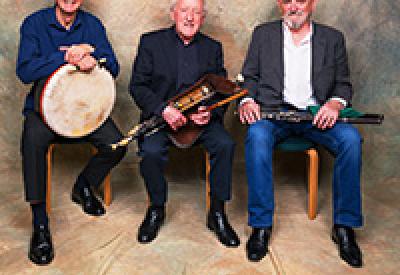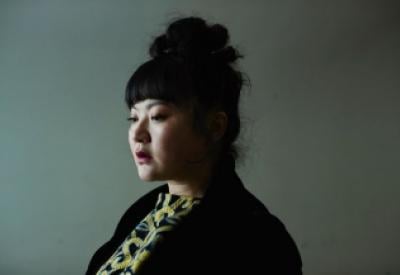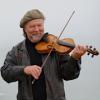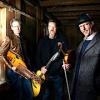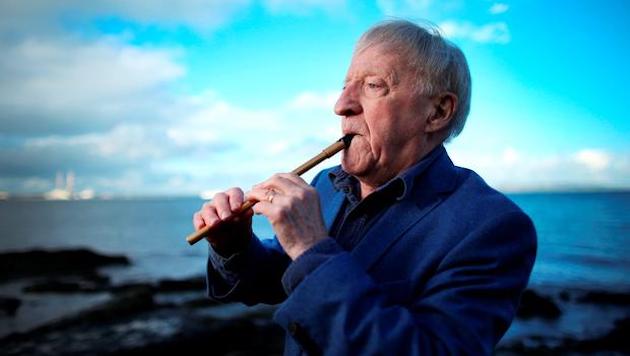
A concert by The Chieftains, now in its 59th year, is a cross between the spirit of a seisún — a jam-session gathering of Irish traditional musicians in a pub — and a stage-filling, star-studded variety show. The singular performances are also very much extensions of the personality of the group’s founder, Paddy Moloney, a master of the uilleann pipes (Irish bagpipes, pronounced “ill-an”), which are inflated by pumping an elbow-powered bellows, rather than by blowing directly into the bag. He is a lifelong, irrepressible proponent of the jigs, reels, hornpipes, and airs of the country where he was born, in 1938, and still lives, in Dublin. As a youth, Moloney joined a band led by Séan Ó Riada, whose integration of Irish folk elements into classical scores paralleled the approaches of composers such as Dvořák, Bartók, and Vaughan Williams.
Several members of Ó Riada’s group followed Moloney into The Chieftains, named after a book by Irish poet and author John Montague, and in the 1970s, the group’s fame was bolstered by a contract with globally- based Island Records and placement on the Oscar-winning score to Stanley Kubrick’s Barry Lyndon, where they intoned the haunting title theme, composed by Ó Riada. With a variety of members performing on flutes, whistles, bodhrán (frame drum), harp, and other traditional instruments and vocals, The Chieftains went on to win six Grammys and other awards, and to perform and record internationally, with repeated visits to Northern California over five decades. Moloney spoke in a lilting brogue with SFCV from his Dublin home, on the eve of yet another tour, which will bring his group to Berkeley’s Zellerbach Hall on Feb. 28 and Los Angeles’s Walt Disney Concert Hall on March 1. He took care to note that naming the tour The Irish Goodbye was not his idea and that “they’re knocking on the door already for another one.”
I’ve seen The Chieftains at several spots around the Bay over the decades, and I wonder if this is a special stop for you.
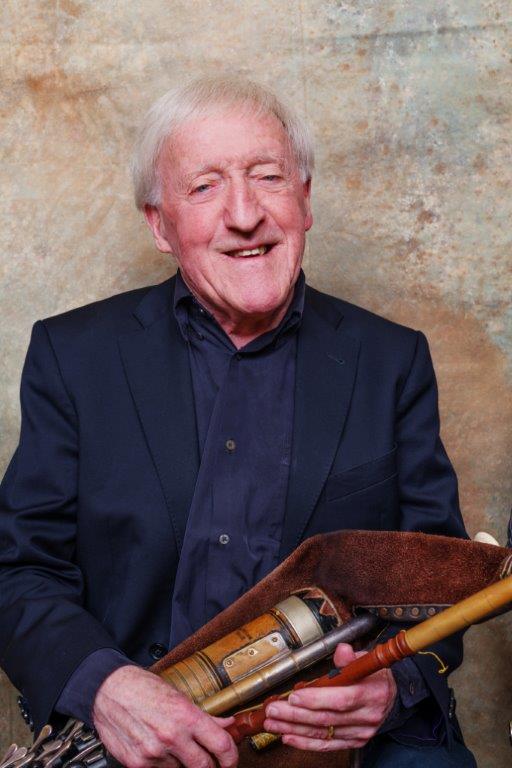
I could go on forever talking about San Francisco, from a personal point of view! I remember one place we stayed was the Press Club, where the amazing thing that caught my eye was a portrait of Éamon de Valera, who’d been raising funds throughout the States for the movement, you know. [De Valera was a leader of the Irish Republican Army during the War of Independence, 1919–1921.] It was great to see a photograph of himself up on their wall. We had two district attorneys from Boston who were groupies and had come out to see us, and they were the ones who pointed it out to us. I also remember playing in — is it the Great American Music Hall?
I just did a review there.
Well, the night we were there, Bing Crosby turned up; somebody told me he was in the front row! That was in the 1970s.
You’ve always had plenty of fans, and not all of them of Irish ethnicity.
One of the things we open up our concerts with is a montage of photographs of people we’ve performed with, from the Rolling Stones to Tom Jones, Pavarotti, and friends like Ted Kennedy and Dolly Parton, who you see giving me a big kiss. [laughs]
Might you hook up with Van Morrison while you’re here? I love that Irish Heartbeat album that you did with him in 1988 [on Polydor], and he’s doing a gig at Yoshi’s in Oakland this month.
You never know. I remember we had a falling out with him, but I got a phone call when we were playing in Santa Rosa, at one of the wineries: “Hello, this is Van, I’m in town, you want me to come up and sing a song?” He came and did the whole second half of the show, totally unrehearsed, just magic! And after that, I did the song “Shenandoah” with him on the soundtrack to Long Journey Home [a 1998 miniseries which won The Chieftains, with Elvis Costello, a Grammy].
I know your shows spring surprises on audiences, but do tell me more of what you have planned for Zellerbach Hall.
I’ll have the great Matt Molloy [flute, tin whistle] and Kevin Conneff [bodhrán, vocals]. And this time, I’m going to make sure they have proper solos. [Conneff, Molloy, and Moloney are the extant members of The Chieftains.] We’re going to have a choir [from the UC Choral Ensembles], and a full pipe band. Then there’s a girl called Alyth [McCormack], she’s from the island of Lewis [in the Scottish Outer Hebrides] who sings Scots Gaelic, but also in Irish and in English, and she’ll look after the choir. Cara Butler, who’s the sister of Jean Butler from Riverdance (Mr. Flatley will not be with us, but he did spend seven years with us), will dance. There are two [other] wonderful dancers we got, the Pilatzkey Brothers, Jon and Nate [from Ontario], and Jon has become a master fiddle player, and I’m giving him a big solo, as well. I’ve got a harp player, Triona Marshall, she came as a special guest after old Derek “Ding-Dong” Bell died. [Bell was harpist with the group from 1975 until his death in 2002.] Triona is a showstopper! And I’ve got a young fiddle player, Tara Breen, from County Clare, and her style of fiddle playing is just exactly what I wanted to hear. She also gets up and dances, and she’ll play a tune or two at the end of the show, on the saxophone! [chuckles]
It really is a variety show! I grew up watching The Ed Sullivan Show on TV, so I like that kind of thing.
Well, I met up with Ed Sullivan in Galway in 1959, and he said, “Would you come on my show?” But as far as I was concerned it was somebody spoofing, so I didn’t believe him. [laughs] But it turned out he had the Clancy Brothers [an Irish folk group, based in the U.S.] on, a year or two before that.
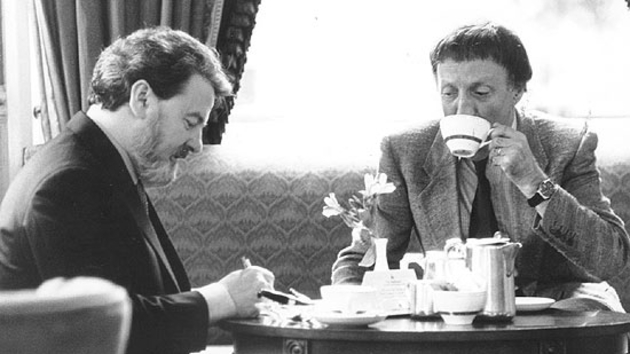
What about the show’s tunes?
We’re going to be touching on some of the old, old items, going back fifty albums or whatever. I thought I’d kick it off with “Women of Ireland”, which got us our Oscar with Kubrick, in 1976. And “Give Me Your Hand” [recorded with flutist James Galway, on Sony Masterworks, in 1987]. I’m going to play a bit of “Bonaparte’s Retreat.” And then just take it from there to “O’Neill’s March,” and then into the reels and other dances. We’re going to touch on some country music, we did three albums of it, and some of our six Grammys came out of that. If they can find a Chinese gong, I’m going to play “Full of Joy,” a tune we played in China in 1983 [and recorded on The Chieftains in China, Shanachie Records, 1985].
Can you reveal any other surprises?
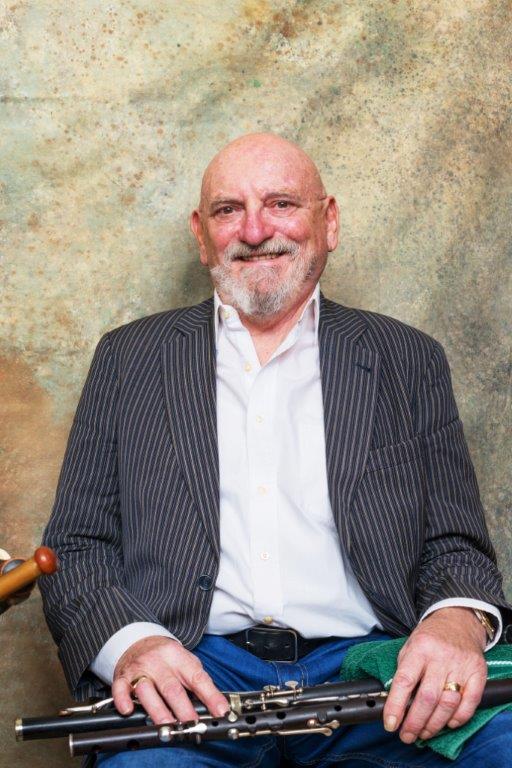
Cady Coleman, who was an astronaut, may join us on this tour [though not in Berkeley]. My son, Padraig, is a rocket scientist who went straight to MIT from Dublin when he was 18, and around that time, I met Cady. She brought a flute and tin whistle with her up onto the International Space Station. She appears with us every so often, to play the flute with Matt [Molloy], and we show the video she sent us of herself, floating around, where she grabs my tin whistle and plays this tune that we gave her, called “Fanny Power” [with lyrics by W.B Yeats; the video will be screened at Zellerbach].
Can you pronounce on the current state of Irish traditional music, at home and abroad? You’re recruiting from the next generation.
The tradition is healthier than ever! There are big and small venues, and you have young people getting up there and performing solo. I wouldn’t go into uilleann pipe competitions any more, though I’ve won five of them, because the standard of playing now is just magic!
Is the music supported by government?
That has changed tremendously. Apart from the Fleadh Cheoil [Celtic Festival, pronounced “Flah Kale”], which I played at in 1950 or ’51 when I was in short trousers, which gets a million a year (and rightly so), there are singers and dancers and musicians happening all the time now. Then there’s a girl I’ll get to meet on Monday, named Lisa Lambe [Irish singer and actress], who’s just come back from the Celtic Connections [festival] in Glasgow. And I think I didn’t tell you yet that we’re going to play at the Lorient Festival, the inter-Celtic festival in Brittany [France].
So there’s more Celtic networking beyond national boundaries?
Stronger than ever before. Even in Cuba, would you believe. I’ve gone to Cuba twice, once for a conference on songwriting, the other to do music for the city of Santiago, because they have a big connection with Santiago in Spain [in the Celtic region of Galicia], and with my very good friend Carlos Núñez [a player of bagpipes and flutes, both Galician and Irish]. Now there’s an uilleann-piping association in Cuba, and it’s spreading and spreading all the time, even to Finland and Norway.
Where some people say the Irish got their red hair from.
[laughs] They got many things from there, and some they didn’t wish for! You go down to Argentina and you find people playing pipes and traditional Irish music. In Japan we had a great tour, and they made me honorary chairman of the Japanese Uilleann Pipers Association. They’re making uilleann pipes there, the best you could ever play. And they have a young group of girls in their 20s and 30s, and they call themselves The Lady Chieftains, which is totally amazing!
Since you and I last chatted, you got a visit at home from Queen Elizabeth, in 2011, the first visit by a reigning monarch to Ireland in a century.
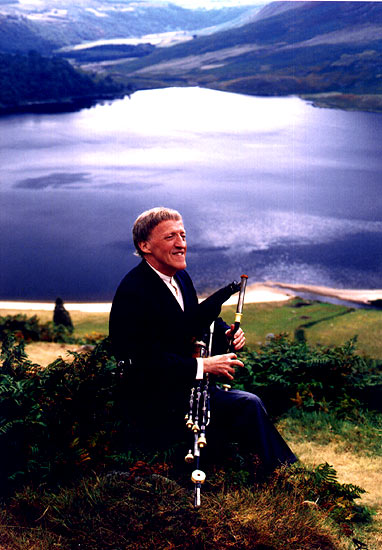
You know me, I’ll have to go back to a story when I was asked to play for the Royal Command at the Palladium in London, a long time ago, and I didn’t feel it was right at the time [because of the political troubles]. But when Mary McAleese, the president of Ireland, before the Queen’s visit, came and asked me, “Would you mind performing?” It was a different kettle of fish then, you know. And the Queen did speak with me for about 30 seconds, but I couldn’t hear a word she was saying, because the bloody orchestra was right behind me, blasting away. [laughs] But Prince Philip came up afterwards and said, “My goodness, how long have you been playing that thing?” I said, “Sixty-two years,” He said, “How old are you?” I said, “Oh, I’m 72.” He said, “Ah, you’re only a young fella.” [Philip was 90 at the time.] He’s quite a humorsome guy.
And you’re 81 now.
Would you believe?
Is there a difference in being an older piper?
Well, you can put that little sweetness into a tune, and twist it in such a way that it’s not what I’d call trash. I like to play and give it its full passion, because I have such great respect for the traditional music. And I have great management now, out of Vancouver, believe it or not, with the Feldman Agency. And my wife, Rita. We did a documentary together [Paddy Moloney: Chieftain, directed by Liam McGrath for Scratch Films, 2015], and she says I’ve been in rehearsal for retirement for the last 10 years or so. [laughs]
My editors would want me checking on your classical connections.
Last year we did three concerts with the Nashville Symphony and three with the Pittsburgh Symphony, music I’ve written for scores and for specialties like the Galician Overture, and the music from Long Journey Home.
So you’ve written for orchestras.
Quite a bit.
And where did you learn that?
It’s all in me head! I did a piece for my grandson Fionn [son of Padraig], he’s 7 now, I started with a lullaby, and it develops with drums and bass, based on Dvořák. He will inherit the piece, you know, as part of the legacy.
But we want to keep you around for a while.
There’s time to go, if the Lord will spare me.
Paddy, you always make things sound new.
Oh, you’re too kind. I live it and love it, once I hit the boards, all the hassle goes out of it, y’know.
Top photo by Chris Boland. www.chrisboland.com


